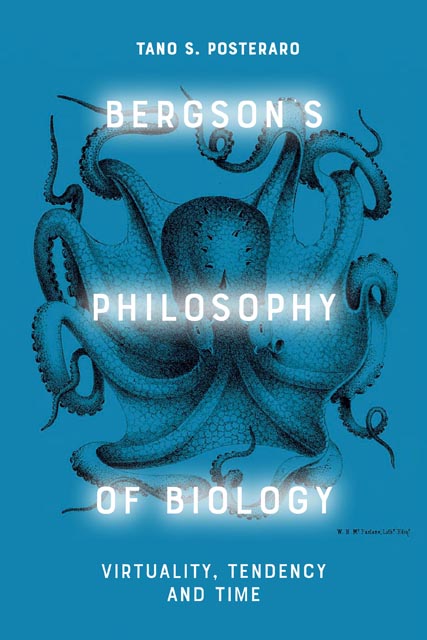Book contents
- Frontmatter
- Contents
- Acknowledgements
- Abbreviations
- Introduction: Between Philosophy and Biology
- 1 The Actual: Mechanism, Finalism, Modality
- 2 The Virtual: Instantiation, Implication, Dynamics
- 3 A Discourse on Tendency
- 4 Individuality and Organisation
- 5 Finalism Inverted
- 6 Canalisation and Convergence
- Concluding Remarks and Future Directions
- Notes
- Bibliography
- Index
Introduction: Between Philosophy and Biology
Published online by Cambridge University Press: 25 October 2023
- Frontmatter
- Contents
- Acknowledgements
- Abbreviations
- Introduction: Between Philosophy and Biology
- 1 The Actual: Mechanism, Finalism, Modality
- 2 The Virtual: Instantiation, Implication, Dynamics
- 3 A Discourse on Tendency
- 4 Individuality and Organisation
- 5 Finalism Inverted
- 6 Canalisation and Convergence
- Concluding Remarks and Future Directions
- Notes
- Bibliography
- Index
Summary
This is a book on Henri Bergson as a philosopher of biology, for readers new to Bergson, Bergson scholars, and philosophers of science interested in but unfamiliar with his views.
While a new wave of enthusiasm for Bergson's philosophy has been rising in anglophone circles since at least the early 1990s, and while we now seem to be in the midst of what some have called a ‘return to Bergson’ and even a full-blown ‘Bergson renaissance’, a number of obstacles to Bergson's uptake as a serious philosopher of biology remain (see Guerlac 2006: x; Kreps 2015: 1; Ansell-Pearson 2018: 1; Lundy 2018a: 5; Sinclair 2020: 2). Among the most significant of these are his association with the legacy of vitalism, his commitment to a scientifically untenable metaphysics, and the progress made by research in the life sciences since (see Canales 2015: 7; cf. Quick 2017). As a result, few philosophers of science have engaged with his work – if they have read or heard of it at all.
This book paints a different portrait. I argue that the typical criticisms are mistaken, and that Bergson should be understood as a philosopher of biology with contemporary relevance. One part of my aim is to provide readers already familiar with Bergson with a systematic appreciation for his philosophy of biology. Another is to provide otherwise unfamiliar readers with a good sense of why Bergson should be taken seriously in relation to the history and philosophy of the life sciences. In the chapters that follow, I distinguish his views from those of traditional vitalism and provide a fresh interpretation of his metaphysics that answers to contemporary concerns. I also show how Bergson's engagement with the mechanistic and teleological assumptions in the sciences of his time can be updated according to current trends in adaptationism and genecentric understandings of evolution and development. On my account, Bergson's thinking should be considered a resource for the recent turn towards process in the philosophy of biology, for the thermodynamic conception of organisation, for the relationship between structure and function, as well as for ongoing attempts to grasp the nature and significance of convergent evolution, the deep unity of life, the metaphysics and epistemology of evolutionary novelty, and a number of other issues in the philosophy of biology besides.
- Type
- Chapter
- Information
- Bergson's Philosophy of BiologyVirtuality, Tendency and Time, pp. 1 - 21Publisher: Edinburgh University PressPrint publication year: 2022



